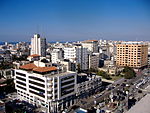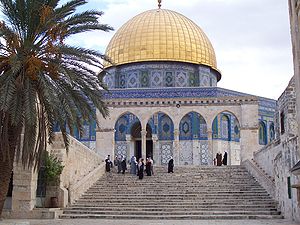- Portal:Palestine
-
- Wikipedia portals:
- Culture
- Geography
- Health
- History
- Mathematics
- Natural sciences
- People
- Philosophy
- Religion
- Society
- Technology
Palestine Portal
The State of Palestine (Arabic: دولة فلسطين, transliteration: Dawlat Filastin) was proclaimed on November 15, 1988 by the Palestinian National Council, the legislative body of the Palestinian Liberation Organization, in Algiers, by a vote of 253-46, with 10 abstentions. The declaration invoked the Treaty of Lausanne (1923) and the UN General Assembly Resolution 181 in support of its claim to a "State of Palestine on our Palestinian territory with its capital Jerusalem". It became the most diplomatically successful of a number of efforts to create a Palestinian state, despite the fact that, because the State of Palestine did not have control over any territory at the time, it did not fulfill the typical requirement of an autonomous state — being in possession of sovereign territory. Currently, the Palestinian National Authority, along with the European Union and the Arab League, envision the establishment of a State of Palestine to include all or part of the West Bank, the Gaza Strip, and East Jerusalem, under a democratically elected and transparent government.
Selected article
Gaza (Arabic: غزة Ghazza) is a Palestinian city in the Gaza Strip, approximately 78 kilometers (48 mi) southwest of Jerusalem, with a population of 410,000, making it the largest city under the control of the Palestinian National Authority.
Inhabited since at least the 15th century BCE, Gaza has been dominated by several different peoples and empires throughout its history. The Philistines made it a part of their pentapolis after the Ancient Egyptians had ruled it for nearly 350 years. Under the Romans and later the Byzantines, Gaza experienced relative peace and its port flourished. In 635, it became the first city in Palestine to be conquered by the Rashidun army and quickly developed into a center of Islamic law. However, by the time the Crusaders invaded the city, it was in ruins. In later centuries, Gaza experienced several hardships from Mongol raids to floods and locusts, reducing it to a village by the 16th century when it was incorporated into the Ottoman Empire. During the first half of Ottoman rule, the Ridwan dynasty controlled Gaza and under them the city went through an age of great commerce and peace.
Gaza fell to British forces during World War I, becoming a part of the British Mandate of Palestine. As a result of the 1948 Arab-Israeli War, Egypt administered the newly-formed Gaza Strip territory and several improvements were undertaken in the city. Gaza was captured by Israel in the Six-Day War in 1967, but in 1993, the city was transferred to the Palestinian National Authority. Hamas took over the city in 2007 after months of clashes with its rival Fatah, and has been under a blockade by Israel.
The primary economic activities of Gaza are small-scale industries, agriculture and labor. However, the economy has been devastated by the blockade and recurring conflicts. Most of Gaza's inhabitants adhere to Islam, although there exists a Christian minority. Gaza has a very young population with roughly 75% being under the age of 25, and today the city has one of the highest population densities in the world—refugees make up over half of the residents.
Selected picture (edit)
History, people, places(edit)
The history of the region of Palestine stretches back to the year 10000 B.C.E.
News(edit)
- November 2: UNESCO votes in favor of Palestine membership
- October 11: Gilad Shalit to be exchanged for Palestinian prisoners
- September 5: Proms performance by Israel Philharmonic Orchestra disrupted
- May 30: Egypt opens border crossing with Gaza
- April 22: Schoolboy dies in Israel after bus hit by rocket from Gaza
- March 26: Bomb on Jerusalem bus kills one, over 30 injured
- March 19: Israel bombarding Gaza after Hamas mortar attack
- March 16: Israel seizes ship claimed to be carrying weapons for Gaza
- March 13: Israel to build new settlements in West Bank
- September 10: New flotilla planned to set sail for Gaza Strip
Did you know... (edit)
- ... that the al-Aqsa Mosque built in the 7th century is the third holiest site in Islam?
- ... that al-Muqaddasi, born in Jerusalem, was a leading medieval geographer?
- ... that the Hebron glass industry goes back to at least the 13th century?
- ... that Antonio Saca, president of El Salvador, is of Palestinian descent?
- ... that Jerusalem, home of the al-Aqsa Mosque and the Church of the Holy Sepulchre, is the holiest location in Christianity and Judaism and the third holiest in Islam?
- ... that refugees and their descendants make up approximately one-third of the entire Palestinian population?
- ... that Nablus, in the northern West Bank, is home to the famed sweet kanafeh?
Culture, arts, cuisine (edit)
Palestinian culture is closely related to the culture of other Levantine countries but is distinct in its own way. For instance,
Palestinian cuisine has many striking similarities with other Levantine cuisines but has several of its own unique dishes.
Palestinian Arabic is easily recognizable. Famous Palestinian writers include the poet Mahmoud Darwish and the scholar Edward Said.
Palestinian music is well-known throughout the Arab world.
WikiProjects (edit)
- WikiProject Palestine
- WikiProject Arab-Israeli conflict
- WikiProject Countering systemic bias
- WikiProject Egypt
- WikiProject Iraq
- WikiProject Israel
- WikiProject Lebanon
- WikiProject Syria
Categories:- Palestine
- Asian portals
- Middle Eastern portals
- WikiProject Palestine
- Portals by country
Wikimedia Foundation. 2010.




